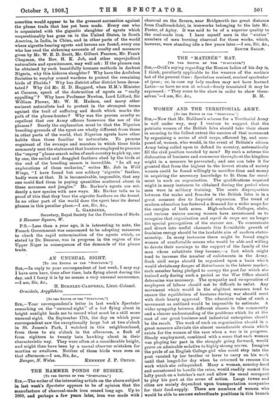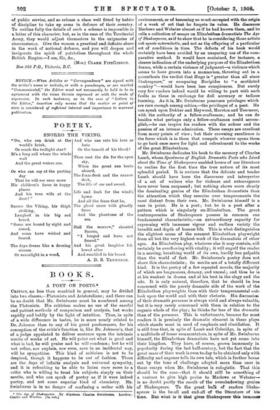WOMEN AND THE TERRITORIAL ARMY.
[TO TIES EDITOR OF THIL "SrECTATOR."] SIR,—Now that Mr. Haldane's scheme for a Territorial Army is well under way, may I venture to suggest that the patriotic women of the 'British Isles should take their share in securing to the fullest extent the success of that movement by organising a series of civil corps, officered by, and com- posed of, women, who would, in the event of Britain's citizen Army being called upon to defend its country, automatically fill the civil position vacated by men ? By such a scheme the dislocation of business and commerce throughout the kingdom might in a measure be prevented ; and one can take it for granted that from the highest to the lowest strata of society women could be found willingly to sacrifice time and money in acquiring the necessary knowledge to fit them for enrol- ment in such an organisation. The qualifications required might in many instances be obtained during the period when men were in military training. The acute disproportion between the males and females in the British Isles is in a great measure due to Imperial expansion. The trend of modern education has fostered a demand for a wider scope for the energies of both sexes. High-schools, Colleges, clubs, and various unions among women have accustomed us to recognise that organisation and esprit de corps are no longer the special prerogatives of the sterner sex. To concentrate and divert into useful channels this formidable growth of feminine energy should be the laudable aim of modern states- manship. In many instances there might be found single women of comfortable means who would be able and willing to devote their earnings to the support of the family of the man whose substitute they became,—a fact which might tend to increase the number of enlistments in the Army. Such civil corps should be organised upon a basis which would obviate any danger of disturbance in the labour market, each member being pledged to occupy the post for which she trained only during such a period as the War Office should determine was necessary. The sympathy and co-operation of employers of labour should not be difficult to enlist. Any movement which would in the slightest measure tend to ensure the equilibrium of business during war should meet with their hearty approval. The educative value of such a movement as outlined would be impossible to estimate. A wider sympathy between different classes in the community and a clearer understanding of the problems which lie at the root of our great business and industrial enterprises should be the result. The work of such an organisation should in a great measure alleviate the almost unendurable strain which exists for the women of the race when a war is in progress. Steady employment, combined with a sense that each woman was playing her part in the struggle going forward, would prove an admirable sedative to highly strung nerves. Imagine the pride of an English College girl who could step into the post vacated by her brother or lover to carry on his work until that longed-for day when he returned to resume the work which she relinquished. Many a woman, country-bred
and accustomed to handle the reins, would readily mount the
lofty perch on a butcher's cart and allow its usual occupant to play his part at the scene of action. Large towns and cities are mainly dependent upon transportation companies for their food-supply. There are numbers of women who would be able to assume subordinate positions in this branch
of public service, and so release a class well fitted by habits of discipline to take up arms in defence of their country. To outline fully the details of such a scheme is impossible in a letter of this character, but, as in the case of the Territorial Army, they would adjust themselves to the exigencies of circumstance. Give the women a practical and defmite share in the work of national defence, and you will deepen and invigorate the spirit of patriotism throughout the whole British Empire.—I am, Sir, &c.,
Bose 282 P.O., Victoria, B.C. (Mrs.) CLARE FITZa
—IBRON.

























































 Previous page
Previous page